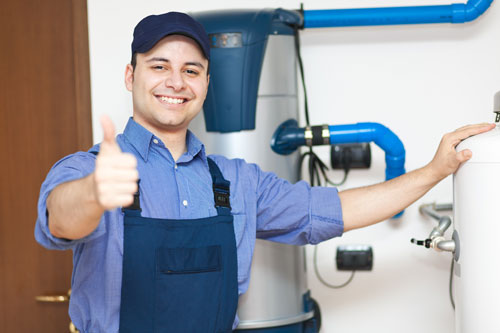A Step-By-Step Guide For Usual Water Heater Issues
A Step-By-Step Guide For Usual Water Heater Issues
Blog Article
They are making several good pointers about Common Problems with Your Home Water Heater overall in the article on the next paragraphs.

Think of starting your day without your regular warm shower. That already sets an inadequate tone for the remainder of your day.
Every house needs a trustworthy hot water heater, but just a couple of know exactly how to take care of one. One easy method to maintain your water heater in top form is to check for faults routinely and fix them as soon as they appear.
Remember to turn off your water heater before smelling about for mistakes. These are the hot water heater mistakes you are probably to come across.
Water as well hot or too cool
Every hot water heater has a thermostat that figures out exactly how hot the water gets. If the water coming into your residence is as well hot despite establishing a practical maximum temperature level, your thermostat may be faulty.
On the other hand, also cold water might be because of a failed thermostat, a busted circuit, or improper gas circulation. As an example, if you utilize a gas hot water heater with a busted pilot light, you would get cold water, even if the thermostat is in perfect problem. For electric heating systems, a blown fuse may be the wrongdoer.
Inadequate hot water
Water heaters can be found in numerous dimensions, depending on your warm water needs. If you run out of hot water prior to every person has had a bath, your hot water heater is also small for your family size. You ought to think about mounting a larger water heater storage tank or selecting a tankless hot water heater, which occupies much less room and is much more resilient.
Unusual noises
There are at least five type of noises you can speak with a water heater, but the most common analysis is that it's time for the hot water heater to retire.
To start with, you ought to be familiar with the regular appears a water heater makes. An electric heating system might sound various from a gas-powered one.
Standing out or banging sounds usually indicate there is a slab of debris in your storage tanks, and it's time to cleanse it out. On the other hand, whistling or hissing noises might just be your shutoffs letting some stress off.
Water leaks
Leakages could originate from pipelines, water connections, shutoffs, or in the worst-case scenario, the storage tank itself. With time, water will wear away the tank, as well as locate its way out. If this takes place, you need to change your hot water heater asap.
However, prior to your change your entire container, make certain that all pipelines remain in location and that each valve works completely. If you still need aid determining a leakage, call your plumber.
Rust-colored water
Rust-colored water suggests one of your water heater elements is worn away. Maybe the anode pole, or the container itself. Your plumber will certainly have the ability to identify which it is.
Lukewarm water
No matter how high you set the thermostat, you won't get any warm water out of a heating unit well past its prime. A water heater's effectiveness may reduce with time.
You will additionally obtain lukewarm water if your pipes have a cross link. This means that when you turn on a faucet, hot water from the heater flows in along with routine, cold water. A cross connection is very easy to spot. If your warm water faucets still follow shutting the hot water heater valves, you have a cross link.
Discoloured Water
Rust is a significant root cause of unclean or discoloured water. Rust within the water container or a stopping working anode pole could trigger this discolouration. The anode rod secures the container from rusting on the inside as well as should be inspected annual. Without a rod or an appropriately functioning anode rod, the warm water promptly corrodes inside the container. Contact a professional water heater professional to identify if replacing the anode rod will certainly deal with the issue; if not, change your hot water heater.
Final thought
Preferably, your water heater can last one decade before you need a change. Nonetheless, after the 10-year mark, you may experience any of these faults a lot more routinely. Now, you need to add a new water heater to your budget.
How To Troubleshoot 3 Common Water Heater Problems in Twin Cities
The Water Heater Is Leaking
A leaky cold water inlet valve A loose pipe fitting A leaky temperature and pressure relief valve A corroded anode rod A cracked tank Turn Off Your Water Heater:
Shut off your gas water heater by turning the gas valve on the unit to the “OFF” position. Shut off your electric water by switching its power off at your electrical panel. Look for a two-pole breaker labeled “water heater” and turn it to the “OFF” position. Move the ball valve connected to the water heater to be perpendicular to the piping at a 90° angle. Look for the Leak:
Depending on whether the water is coming from the tank's top or bottom, you’ll want to look for the leak in different locations.
If the leak comes from the top of the tank, carefully look for water escaping from the cold water inlet valve or loose pipe fittings. Rusted hot and cold water valves can have loose connections with the tank, with water leaking out of them.
https://mspplumbingheatingair.com/blog/how-to-troubleshoot-3-common-water-heater-problems
We are very enthusiastic about Water Heater Repair and Troubleshooting and I'm hoping you liked my blog entry. Enjoyed reading our posting? Please share it. Help others check it out. I value reading our article about Water Heater Repair and Troubleshooting.
We're ready, are you? Report this page